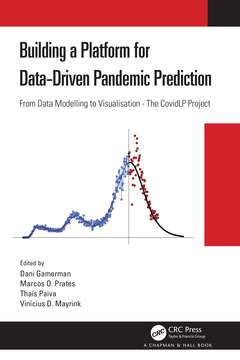Description
Building a Platform for Data-Driven Pandemic Prediction
From Data Modelling to Visualisation - The CovidLP Project
Coordinators: Gamerman Dani, Prates Marcos O., Paiva Thais, Mayrink Vinicius D.
Language: English
Subjects for Building a Platform for Data-Driven Pandemic Prediction:
Keywords
Generalised Logistic Model; epidemiology; Posterior Distribution; bayesian; HMC; infectious diseases; Generalised Logistic Curve; covid-19; Credible Intervals; coronavirus; GitHub Repository; Markov Chain Monte Carlo Method; Notification Date; Negative Binomial Distribution; MCMC Method; Model Fitting; MCMC; Prior Distribution; Integrated Nested Laplace Approximation; Shiny App; Negative Binomial Models; Prediction Intervals; True Count; Sari; Data Frame; Minas Gerais; Predictive Distribution; Input Argument; Negative Binomial; Online Application
Publication date: 09-2021
· 15.6x23.4 cm · Hardback
Publication date: 09-2021
· 15.6x23.4 cm · Paperback
Description
/li>Contents
/li>Biography
/li>
This book is about building platforms for pandemic prediction. It provides an overview of probabilistic prediction for pandemic modeling based on a data-driven approach. It also provides guidance on building platforms with currently available technology using tools such as R, Shiny, and interactive plotting programs.
The focus is on the integration of statistics and computing tools rather than on an in-depth analysis of all possibilities on each side. Readers can follow different reading paths through the book, depending on their needs. The book is meant as a basis for further investigation of statistical modelling, implementation tools, monitoring aspects, and software functionalities.
Features:
- A general but parsimonious class of models to perform statistical prediction for epidemics, using a Bayesian approach
- Implementation of automated routines to obtain daily prediction results
- How to interactively visualize the model results
- Strategies for monitoring the performance of the predictions and identifying potential issues in the results
- Discusses the many decisions required to develop and publish online platforms
- Supplemented by an R package and its specific functionalities to model epidemic outbreaks
The book is geared towards practitioners with an interest in the development and presentation of results in an online platform of statistical analysis of epidemiological data. The primary audience includes applied statisticians, biostatisticians, computer scientists, epidemiologists, and professionals interested in learning more about epidemic modelling in general, including the COVID-19 pandemic, and platform building.
The authors are professors at the Statistics Department at Universidade Federal de Minas Gerais. Their research records exhibit contributions applied to a number of areas of Science, including Epidemiology. Their research activities include books published with Chapman and Hall/CRC and papers in high quality journals. They have also been involved with academic management of graduate programs in Statistics and one of them is currently the President of the Brazilian Statistical Association.
I Introduction
1. Overview of the book
2. Pandemic Data
II Modelling
3. Basic Epidemiological Features
4. Data Distributions
5. Modelling Specific Data Features
6. Review of Bayesian Inference
III Further Modelling
7. Modelling Misreported Data
8. Hierarchical Modelling
IV Implementation
9. Data Extraction/ETL
10. Automating Modelling and Inference
11. Building an Interactive App with Shiny
V Monitoring
12. Daily Evaluation of the Updated Data
13. Investigating Inference Results
14. Comparing Predictions
VI Software
15. PandemicLP Package: Basic Functionalities
16. Advanced Settings: The Pandemic Model Funtion
VII Conclusion
17. Future Directions
Dani Gamerman was Professor of Statistics at UFRJ from 1996 to 2019. He is currently Professor Emeritus at UFRJ since 2021 and Visiting Professor at UFMG since 2019. Director of the Graduate Program in Statistics at UFRJ (1999-2006 and 2015-2019). Published papers at JRSSB, Biometrika, Statistics and Computing, Bayesian Analysis, Journal of Multivariate Analysis, Applied Statistics and other journals. Author of books Monte Carlo Markov Chain: Stochastic Simulation for Bayesian Inference and Statistical Inference: an Integrated Approach, both with Chapman & Hall in their 2nd edition. Supervised 19 M.Sc. and 18 Ph.D. students. Visiting professor of a number of academic institution world-wide. Delivered seminars at many scientific meetings and universities world-wide, including plenary talks at a Valencia meeting and an ISBA world meeting. Editor of 5 statistical journals. Organized many statistical conferences in Brazil.
Marcos Prates obtained his bachelor's in 2006 in the Computational Mathematics program at the Universidade Federal de Minas Gerais (UFMG) and a master's in Statistics in 2008 from the same institution. In 2011 he received his Ph.D. in Statistics from the University of Connecticut and was a Visiting Professor in the same institution from 2019 to 2020. Currently, he is an Associate Professor at UFMG. His main research areas are Bayesian Statistics, Generalised Linear Mixed Models, Machine Learning, and Spatial Statistics. He was Director of the Graduate Program in Statistics in UFMG (2016-2018), was the Secretary for ISBRA, the Brazilian chapter of ISBA (2015-2016), and currently is the President of the Brazilian Statistical Association (2020-2022).
Thais Paiva obtained a bachelor degree in Actuarial Science from the Universidade Federal de Minas Gerais (UFMG) in 2008, and a Masters in Statistics from the same university in 2010. She earned a PhD degree in Statistics at Duke Univers




